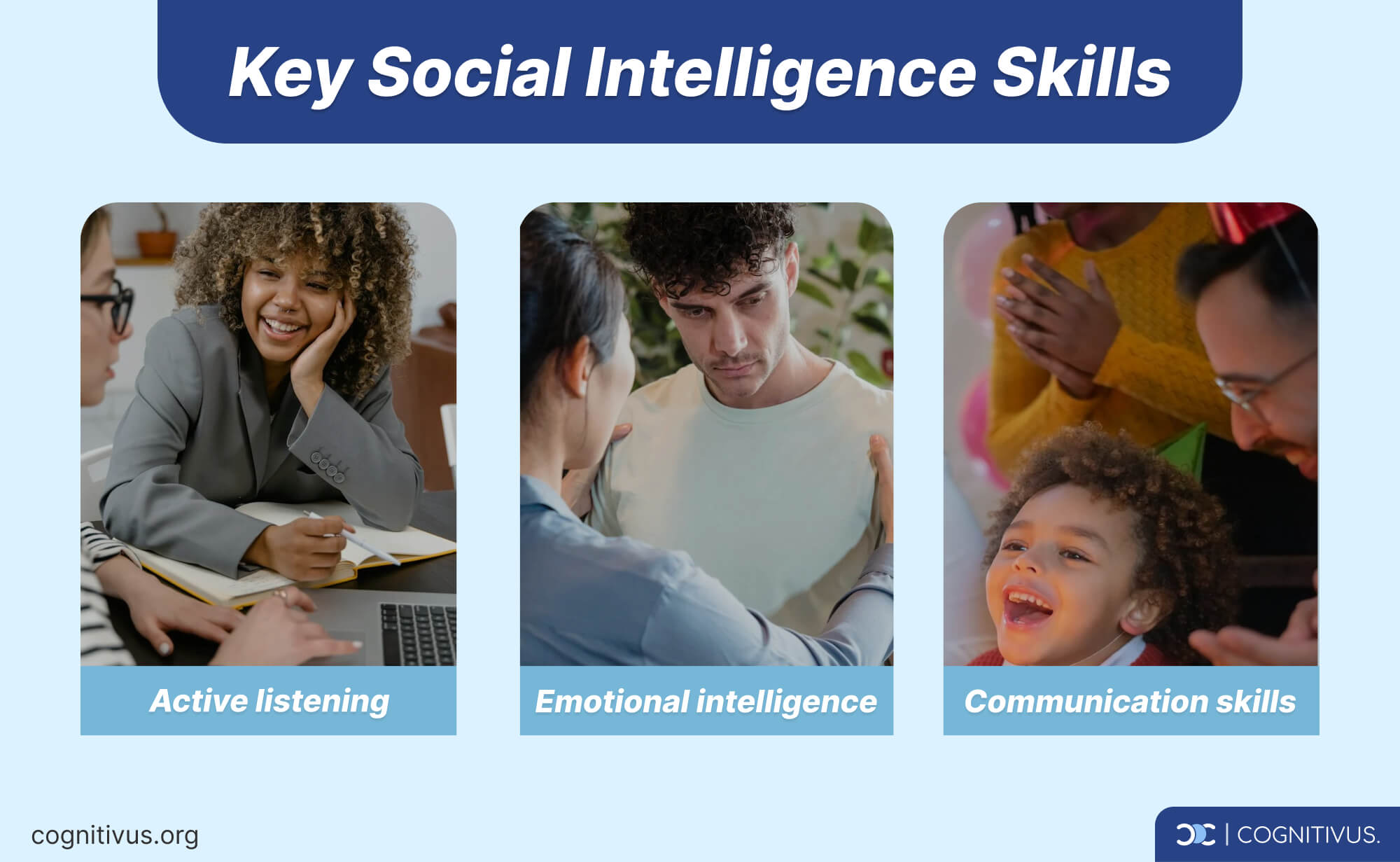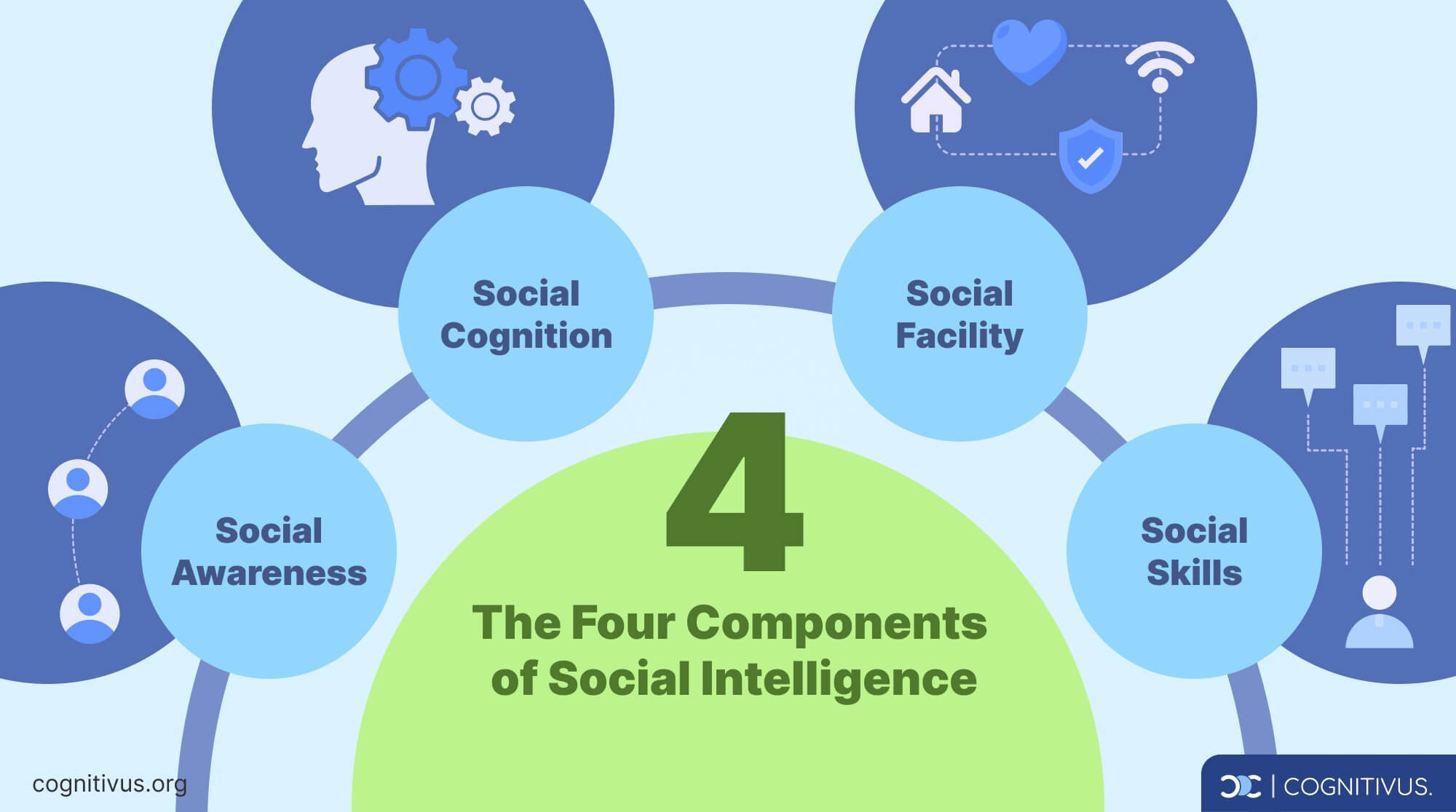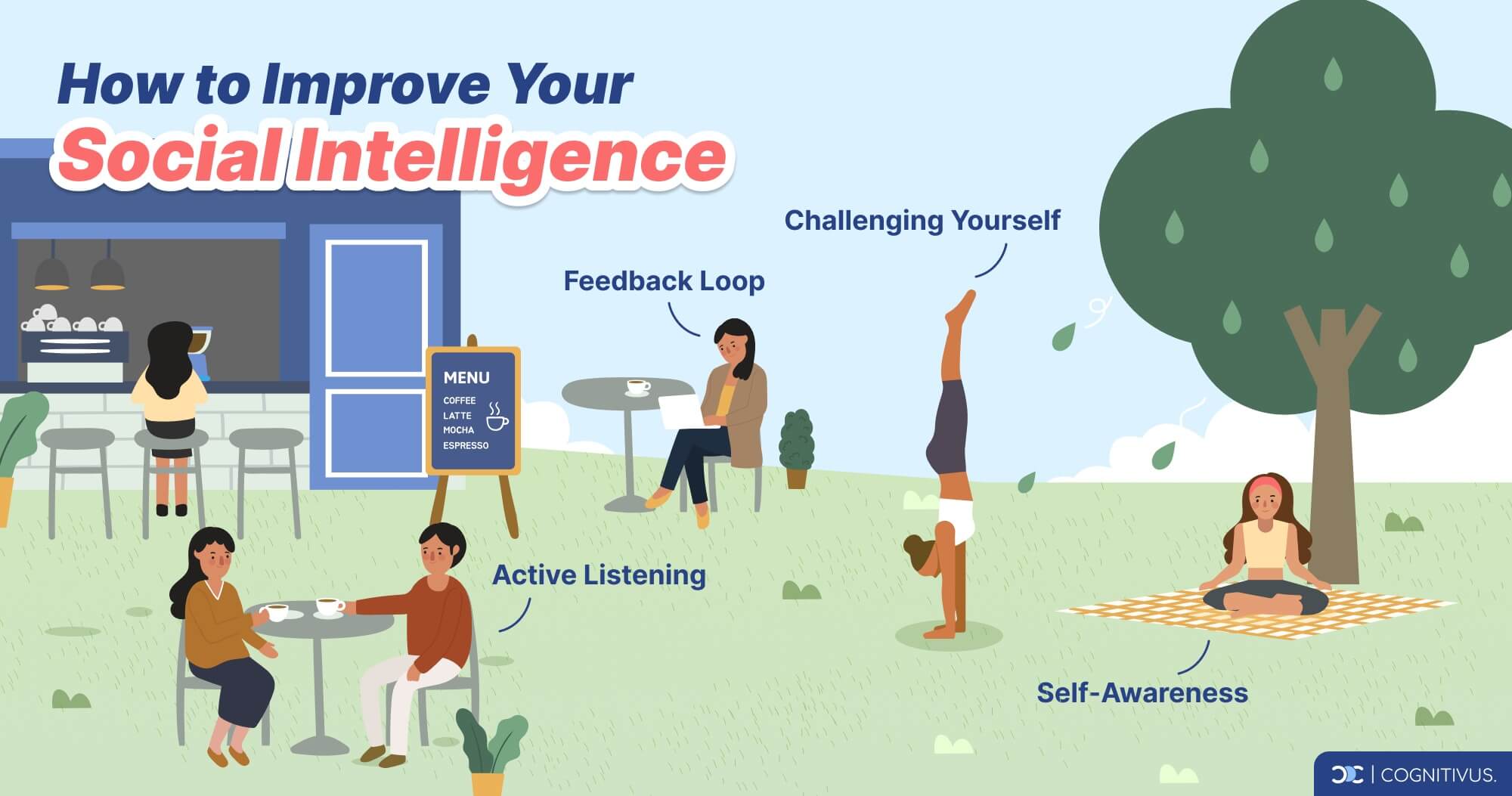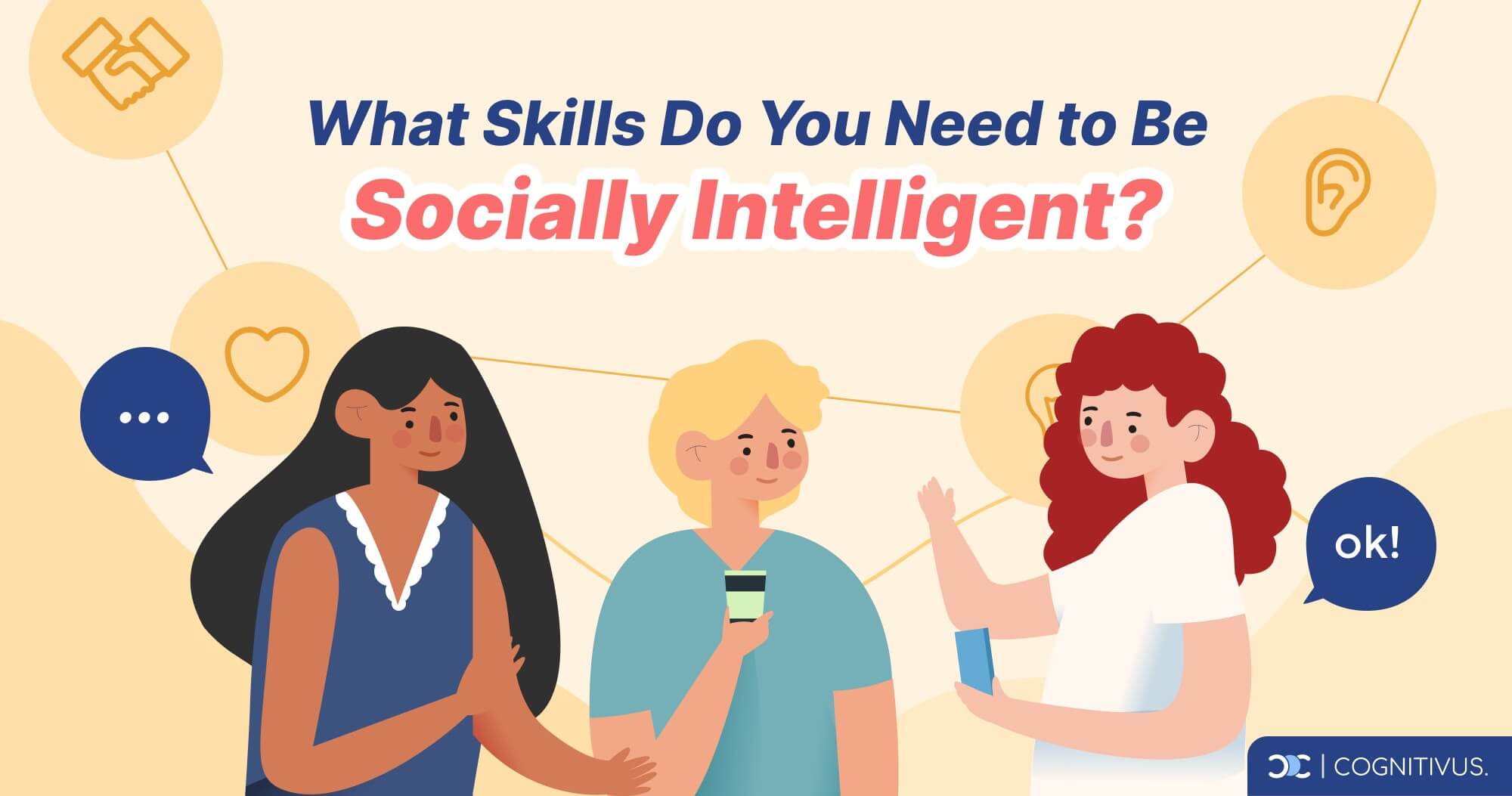Social intelligence is the ability to understand others' thoughts and feelings and to interact and communicate effectively according to the social scene. Whether you're looking to hone your leadership skills, grow closer to friends and family, or simply interact with strangers on a more refined level, improving your social intelligence can be the key to building these interactions! It is a crucial skill for navigating life's social landscapes and can greatly improve daily functioning, helping to build greater trust and understanding with others in your life.
1. Understanding the Core Skills of Social Intelligence
Three key traits form the foundation of social intelligence: active listening, emotional intelligence and adept communication. These essential attributes allow individuals to interact harmoniously and effectively within society.
Key Social Intelligence Skills
- Active listening means tuning in to what others are saying, both verbally and non-verbally, and responding with thoughtfulness and consideration.
- Emotional intelligence, which involves being attuned to your own emotions as well as those of others, often goes hand in hand with active listening. It helps you to understand what may be going on under the surface. Together, these skills enable people to navigate social interactions with ease and grace.
- Communication skills, on the other hand, are the tools you use to express your thoughts, feelings, and ideas to others effectively. This includes both verbal soft skills, such as clarity and persuasion, and the often-overlooked non-verbal communication, like body language and facial expressions. So, it's not just about talking, but actually expressing yourself clearly and successfully picking up on cues from others. By mastering both forms of communication, you can build stronger, more meaningful relationships and cultivate greater personal success within social roles.

The combined impact of these skills cannot be overstated. Together, they pave the way for positive social interactions where mutual understanding and cooperation can thrive. They help individuals pick up on the social cues that are essential for creating and maintaining connections in both personal and professional spheres.
How to Recognize a Socially Intelligent Person
So, how can you tell if someone is socially intelligent? A socially intelligent person is someone who effortlessly blends social cognition with empathy to navigate the complex world of human relationships. This person understands the intricate link between emotions and social dynamics; they read situations accurately, are aware of the feelings of others, and respond appropriately.
Researchers have recently delved deep into understanding how empathy directly impacts one's social intelligence. According to their findings, there is a substantial positive correlation between the ability to comprehend others' emotions and competence within social settings. This doesn't just apply to one age group; this skill spans across the board, opening up a whole new world of how social skills can be understood and taught.
When you encounter a socially intelligent person, you will notice they are superb listeners and keen observers, who notice all the little details. They are often the ones who smooth out conflicts with ease and composure. They value relationships and treat them with the care they deserve, ensuring everyone feels heard and respected. It is this highly personal approach that makes them well-liked and respected.
Understanding these skills and identifying such individuals can greatly enhance one's social intelligence. With a bit of practice and mindfulness, you can level up your own social abilities leading to a richer, more connected experience with the people around you!
2. How to Develop Your Social Intelligence
The Four Components of Social Intelligence
Social intelligence has several layers that, when combined, create one's ability to thrive in social scenarios. So, let's break down these layers. These are each critical to your understanding of social roles and interactions. Famous psychologist Daniel Goleman has identified these as social awareness, social cognition, social facility, and social skills.
- Social awareness is your ability to accurately read a situation and understand the unspoken dynamics in a room. Think of it as your social radar, picking up cues others might miss. It allows you to appreciate others' emotions without them having to spell them out for you. It is one of the best habits to take to improve your emotional intelligence.
- Social cognition refers to how you process and apply information about people and social situations. It's the mental gymnastics that help you interpret and predict behaviour in the room! It's like solving a puzzle, whereby you piece together the people plus the situation to predict how it all unfolds.
- Social facility is about how smoothly you manage your social interactions. The smoother the interaction, the more gifted you are at applying your social skills in real time. It's all about keeping the conversation flowing smoothly and turning awkward moments into peaceful understandings.
- Last but not least, social skills are like your toolkit for navigating these social situations. These range from resolving conflict to showing empathy. It's not only about being friendly, but also about maintaining and managing your relationships with finesse and understanding.

How to Improve Your Social Intelligence
With social awareness, cognisance, facility, and skills in your arsenal, the next step is improving each of these components to raise your social intelligence and get a higher social quotient - social quotient being a measure of social intelligence.
Contrary to what some may think, just because someone is conventionally smart doesn’t necessarily mean they've also got the social side down. In fact, a team of Spanish researchers have found that excelling in academic or abstract intelligence does not guarantee social savvy or automatically make you a pro. Instead, it presents a need for tailored strategies to develop these imperative life skills, especially for gifted individuals.
So, here are some strategies to help you boost your social intelligence.

Listen actively
First off, practice your active listening. Every conversation is an opportunity to improve – pay attention not purely to words, but also to tone and body language. This is why active listening is one of the top habits for better emotional intelligence. Remember, listening is a two-way street; it involves not only hearing but also expressing understanding and asking questions to deepen your comprehension. By doing this, you show that you value the speaker's perspective and you can foster a more meaningful connection.
Keep a feedback loop
Reflect on your own experiences and apply what you've learned to new social situations. Remember that every interaction is a chance to refine your understanding of the subtle dynamics at play. This continuous feedback loop helps you to recognise patterns and adapt your behaviour. Keeping a journal can be a helpful tool for tracking your progress and visually identifying areas for improvement!
Be more self-aware
Moreover, practising self-awareness helps you tune into your emotions and reactions. This emotional intelligence is vital, as it forms the basis of your relationships and interactions.
By knowing your triggers and reactions, you can better manage responses and engage with others more effectively. Practising mindfulness or meditation can be a great way to help you become more in tune with your emotions and stay present in your social interactions.
Challenge yourself
Finally, don't be afraid to step out of your comfort zone. Every new person you meet, and every different social setting you find yourself in, offers a ripe environment to test and hone your instincts. See these challenges as opportunities to grow! Whether it's starting a conversation with someone new, joining a group activity or attending a new social event, all these experiences can build your confidence and ability to adapt to any given situation.
By integrating these practices into your life, you can cultivate and improve your social intelligence, leading to richer interactions, more fulfilling relationships, and an overall greater command of social situations.
3. How to Measure Social Intelligence
You may be curious about how to gauge your current level of social intelligence. Like any other set of skills, social intelligence can be assessed, and, more importantly, improved. Psychologists have developed tools such as the Tromsø Social Intelligence Scale and the Emotional and Social Competence Inventory to help individuals gain the self-awareness needed for growth.
The Tromsø Social Intelligence Scale (TSIS), developed at the University of Tromsø by Silvera, Martinussen, & Dahl in 2001, is a practical tool aimed at measuring social intelligence using a 21-item scale. It assesses three key dimensions: social awareness, social information processing (an aspect of social cognition), and social skills. Respondents rate themselves on a 7-point scale on how frequently they exhibit certain social behaviours. The TSIS has undergone meticulous validation through multiple studies to ensure its reliability and to refine the underlying dimensions of social intelligence.
On the other hand, the Emotional and Social Competence Inventory (ESCI), developed by Richard Boyatzis and Daniel Goleman, takes a holistic approach with its 360-degree assessment method. This tool measures twelve competencies, including emotional self-awareness, empathy, organizational awareness, conflict management, and inspirational leadership, among others. It gathers feedback from a variety of sources — peers, managers, direct reports, and others — to help individuals understand how they are perceived by others in terms of emotional and social skills. This comprehensive feedback is crucial for personal development, allowing individuals to identify their strengths and areas needing improvement.
Both tools are designed to enhance the understanding and development of social intelligence. They offer structured feedback to help you navigate social interactions more effectively and develop strategies to enhance your interpersonal skills.
4. Social Intelligence for Leadership
Leaders listen up. Much like emotional intelligence in general, the impact you have on your team, and every person you lead, is closely tied to your social intelligence. The correlation between effective leadership and social skills is hard to overlook. The best leaders can engage, inspire, and motivate their teams as they are the ones with a strong grasp of social dynamics.
When you can understand the emotions of your team and respond to them appropriately, you set a positive tone for the entire group. This is not simply about delivering messages, but instead doing so in a way that really resonates and gets people to respond.

Daniel Goleman and Richard E. Boyatzis pointed out in a Harvard Business Review article that empathetic leaders who make emotional connections can actually significantly enhance their team's mood and performance.
Leaders with high social intelligence create supportive and productive environments. They can handle complex social situations smoothly and with grace, using their social skills to resolve conflicts and unify their team under a common goal.



